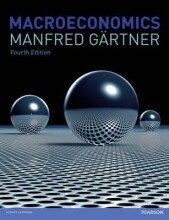Monetary Policy - the demand for money - shifts of the money demand curve
9 important questions on Monetary Policy - the demand for money - shifts of the money demand curve
What happens when there is an decrease in the demand for money on the graph? What happens to quantity of money demanded?
- when there is an decrease in the demand for money it corresponds to a leftward shift of the demand curve
- this reduces the quantity of money demanded at any given interest rate
What are the most important factors that cause the money demand curve to shift?
changes in real GDP
changes in credit markets and banking technology
changes in institutions
Why do people keep a lot more of money in their wallets
- Higher grades + faster learning
- Never study anything twice
- 100% sure, 100% understanding
Other things equal, the higher the prices, what will happen on the graph? Why?
- A higher price
- will increase the demand for money
- shifting the MD curve to the right
- the price of everything rises, it takes more to buy the same basket of goods and services so there will increase the demand for money
What is the relation ship between the quantity of goods and services firms buy and the quantity of money they will want to hold?
Before people would pay using cash or check. What is the relationship between the invention of credit card and the demand for money
- The invention of the credit card allowed people to hold less money
- decrease the demand for money
- money demand shifts left
What is the relationship between the banking technology that helps with converting from interest bearing to cash and the demand money?
- improvements in the banking technology
- easy to buy without having to convert interest bearing assets interest bearing to cash (leave the money in my account)
- decreasing the demand for money
- shift demand curve to the right
How does the increase in banking competition in the banking sector combined with increased use of new information technologies affect the money demand
- because it is easy to change from the nonchequable to the chequable
the - the OPC of holding money is LOW because there are no cost of converting between accounts so i can easily have my money whenever i want
- This increases the money demand
How do non chequable high interest saving accounts that combine conversion features of a chequing account affect the demand for money? What are their advantages to banks and customer?
- They reduce the opportunity cost of holding money becasue there is no costs related to cinverting the money
- leading to a rise in the demand for money
- the banks like them because they involve paperwork, depositors like them because via internet they can quickly transfer their funds from a high interest to a low interest savings account to a chequable account
The question on the page originate from the summary of the following study material:
- A unique study and practice tool
- Never study anything twice again
- Get the grades you hope for
- 100% sure, 100% understanding































